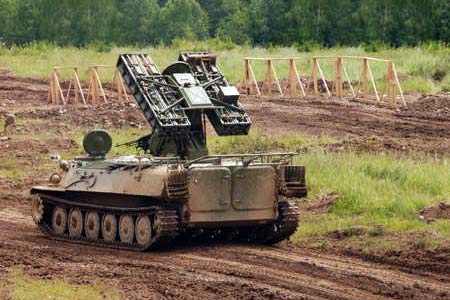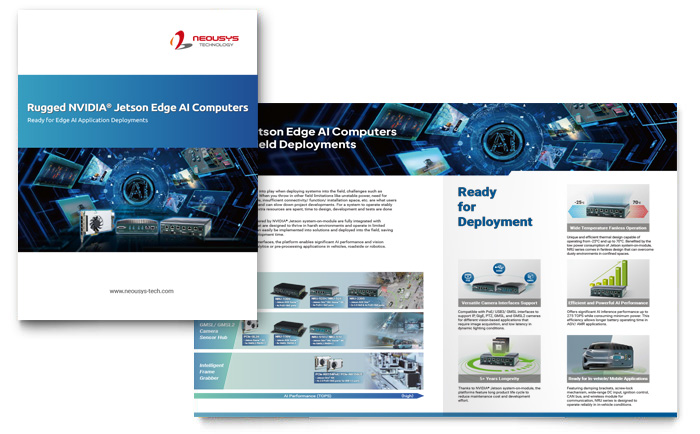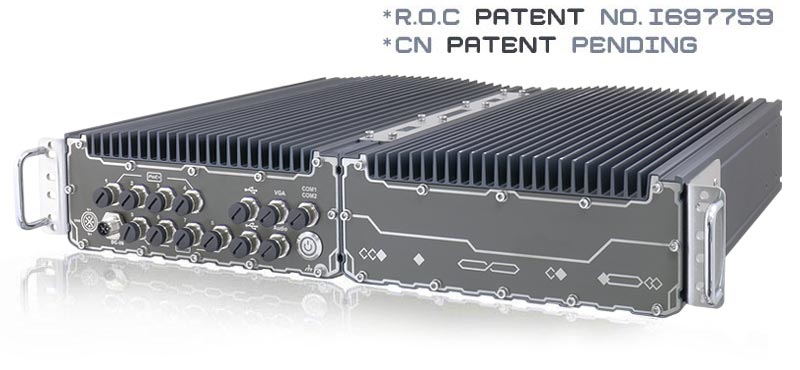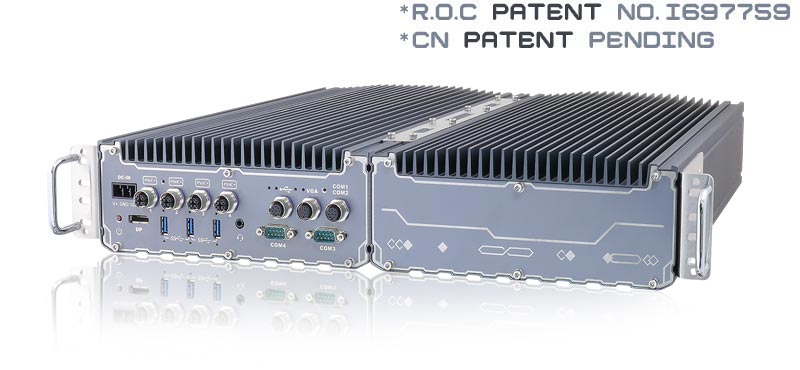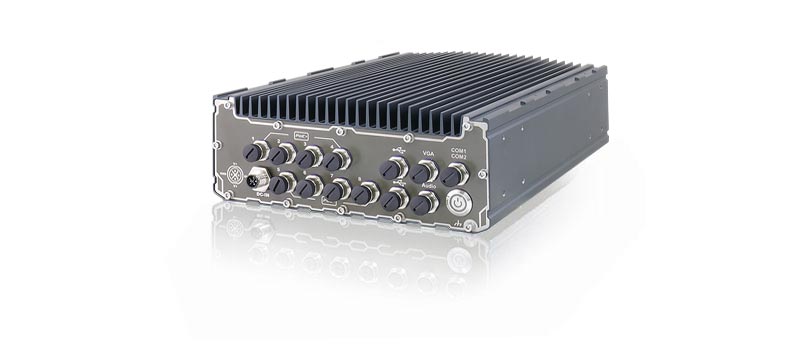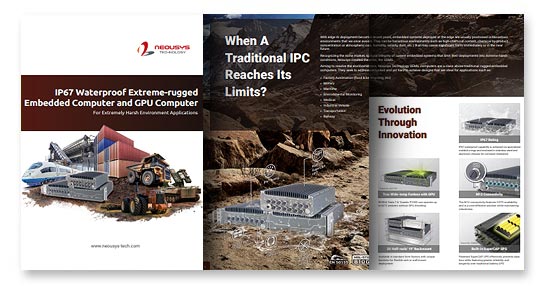Overview
Neousys' NVIDIA® Jetson™ Rugged Computer solutions are engineered to meet the ever-evolving demands of edge AI applications. From edge inspection and roadside systems to AMR, in-vehicle IVA, and ADAS, these platforms feature rugged designs, versatile onboard camera connectivity, and diverse form factors. Each product is purpose-built to deliver optimal performance and reliability across various deployment environments.
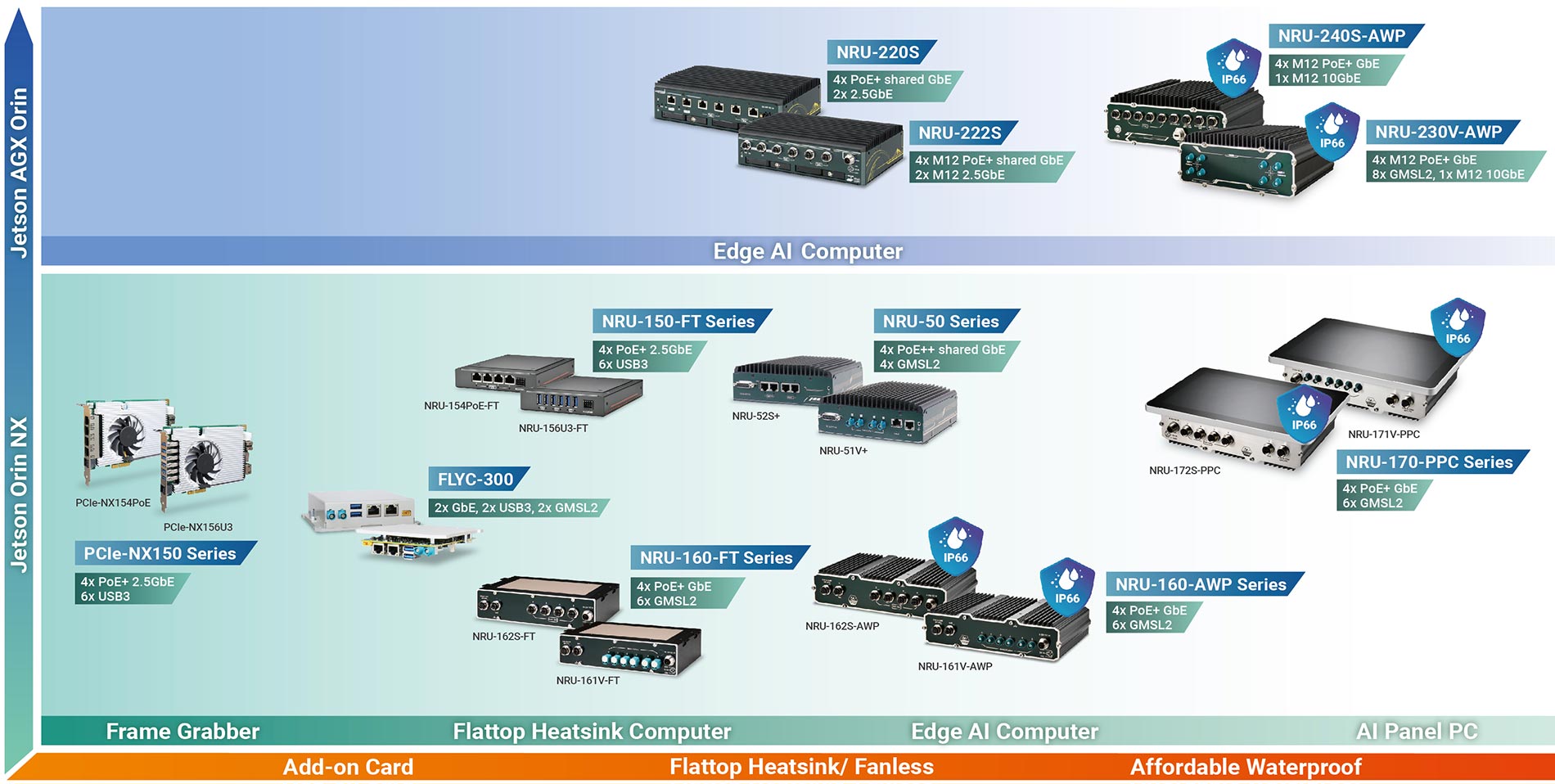
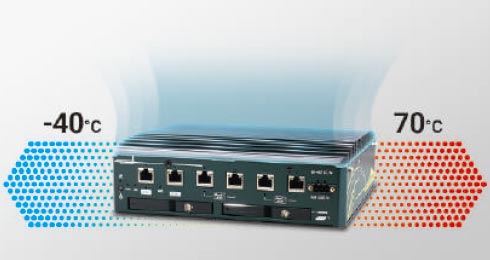
Rugged, Fanless and Waterproof
Capable of operating from -40°C and up to 70°C in fanless conditions.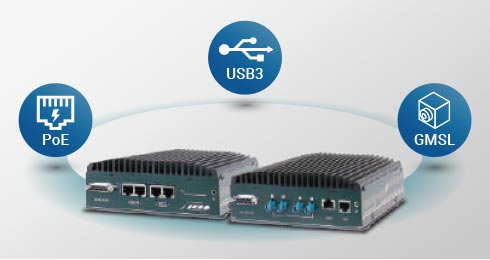
Versatile Camera Support
Compatible with PoE+ GbE/ USB3/ GMSL2 interfaces. Explore the list of GMSL2 cameras with pre-installed drivers >>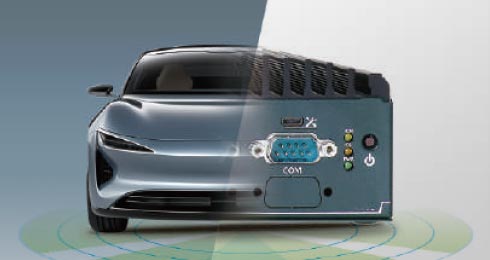
Ready for In-vehicle/ Mobile Deployments
Engineered for reliable operation in tough in-vehicle conditions.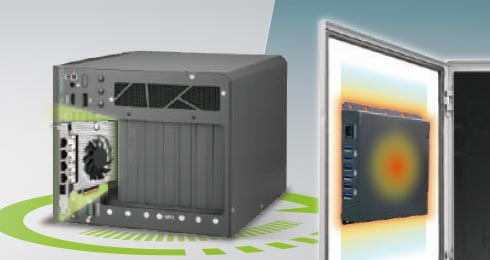
Diverse Application Form Factors
Application-driven products such as AI frame grabber, flattop heatsink computer, or mission computer.Robust AI Vision from Factory to Road
Edge Inspection
Scenario
In the past, a CPU-based architecture was used for automation processes with multiple stations along the production line, from cleaning, inspection, sorting, to packing. To enhance overall automation efficiency and precision, integrating additional AI performance into the existing CPU-based automation process is a new trend.
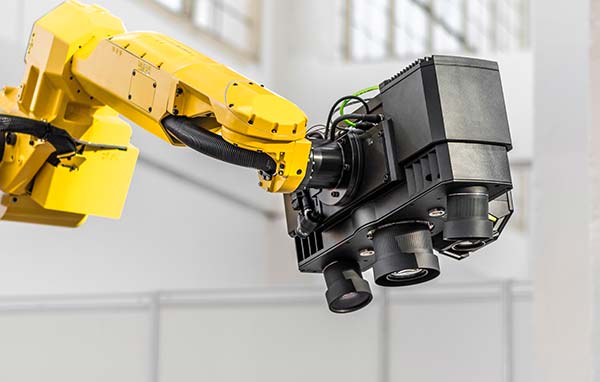
Challenges
The challenges of incorporating AI computing into traditional CPU-based 19" rack mount or expansion box pc include:
- Significant AI performance for real-time image processing from multiple cameras
- Inability to supply sufficient power to power-hungry GPU cards
- Issues with heat dissipation from GPU cards
- Insufficient expansion slots for installing GPU cards and frame grabber cards
Neousys' Offering
Neousys' industrial-grade intelligent frame grabber PCIe-NX150 series, and flattop heatsink edge AI computer NRU-150-FT series, are lightweight solutions designed to enhance AI capabilities to existing CPU-based machine vision and inspection systems. They are equipped with full-bandwidth 6x USB3 or 4x PoE+ GbE ports for camera connectivity, 100 TOPS AI performance, while ensuring rugged, wide-temperature operation.
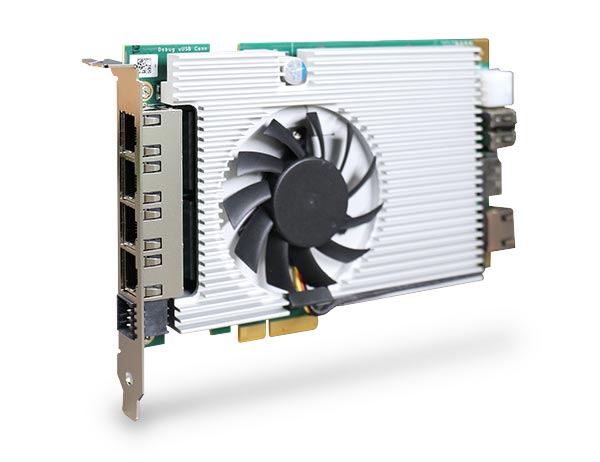
|

|
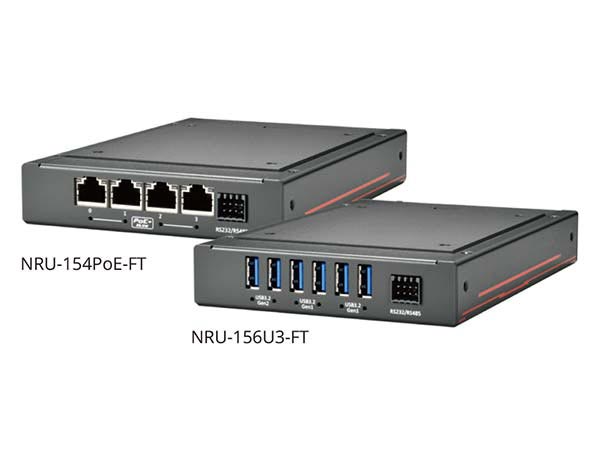
|
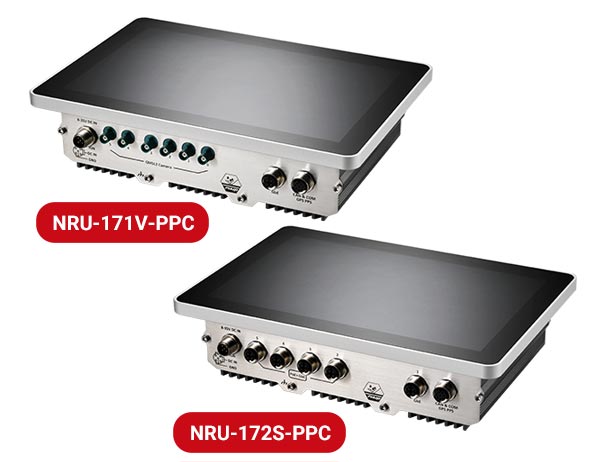
|
PCIe-NX154PoENVIDIA® Jetson Orin™ NX Intelligent Frame Grabber Card with 4x PoE+ ports |
PCIe-NX156U3NVIDIA® Jetson Orin™ NX Intelligent Frame Grabber Card with 6x USB 3.2 ports |
NRU-154PoE-FT/NRU-156U3-FTNVIDIA® Jetson Orin™ NX Flattop Heatsink Computer with 4x 2.5GbE PoE+/6x USB 3.2 Ports |
NRU-172S-PPCIP66-rated 10.1" NVIDIA® Jetson Orin™ NX/ Nano Panel PC with 4x PoE+ GbE Ports |
Roadside IVA
Scenario
With urban infrastructures becoming more AI-enabled, such as intelligent traffic, V2X communication, public space IVA, etc., the need to deploy roadside edge AI computers for real-time image capturing and processing has become more prevalent.
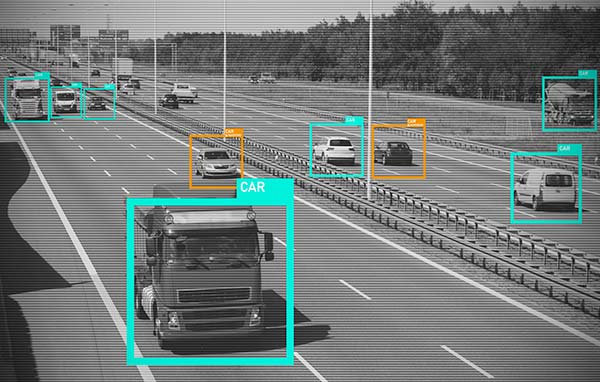
Challenges
Deploying edge AI computers in roadside cabinets needs to overcome the following challenges:
- Significant AI performance for real-time image processing from multiple cameras
- Extreme weather temperatures ranging from freezing winters to scorching summers
- Heat dissipation inside cabinets
- Roadside environments causing dust to accumulate inside computers
Neousys' Offering
The NRU-220S, NRU-52S+, NRU-154PoE-FT stand out as fanless AI NVRs with built-in connectivity for multiple PoE+/ PoE++ IP cameras. Engineered with a wide operating temperature range, these devices facilitate intelligent video analytics for roadside applications. Furthermore, they include an isolated RS-484 interface for seamless infrastructure communication.

|
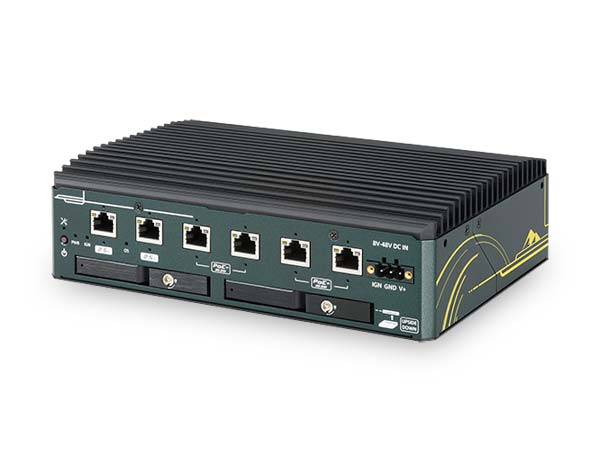
|

|

|
NRU-240S-AWPIP66-rated NVIDIA® Jetson AGX Orin™ Computer with 1x 10GbE, 4x PoE+ GbE Ports |
NRU-220SNVIDIA® Jetson AGX Orin™ AI NVR with 4x Shared PoE+ GbE & 2x 2.5GbE Ports |
NRU-52S+NVIDIA® Jetson Orin™ NX Edge AI Computer with 4x PoE++ Ports |
NRU-154PoE-FT/NRU-156U3-FTNVIDIA® Jetson Orin™ NX Flattop Heatsink Computer with 4x 2.5GbE PoE+/6x USB 3.2 Ports |
Autonomous Mobile Robots
Scenario
There are more and more autonomous Mobile Robots (AMRs) applications ranging from smart agriculture, autonomous warehouse, last-mile delivery. Multiple sensors and sufficient AI performance are essential to enable the AMR to interact with its surroundings.
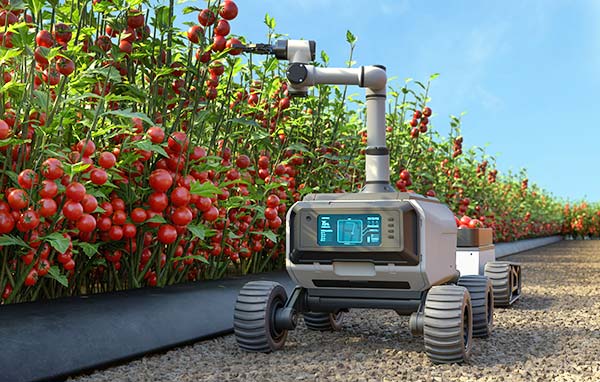
Challenges
One integrating a computing unit into a robot may encounter the following challenges:
- Multiple camera and sensor connectivities
- Significant AI performance for real-time image processing from multiple cameras
- Limited space for deployment
- Heat dissipation
- Powered by limited battery capacity
- Considerations for shock and vibration
- Mobile communication capability
Neousys' Offering
The NRU series delivers outstanding AI performance for up to six GMSL cameras, all while maintaining an ultra-low power consumption of just 15 to 30 watts, enabling extended operation for AMRs, even on battery power. It supports both 2D and 3D GMSL2 automotive cameras, providing clear vision in dynamic lighting conditions and precise distance measurement for obstacle avoidance. With a wide voltage input range of 8 to 35V and 4G LTE/5G NR connectivity for seamless communication, this rugged, compact AI computer is designed to tackle outdoor challenges, making it the perfect choice for AMR applications.

|

|

|
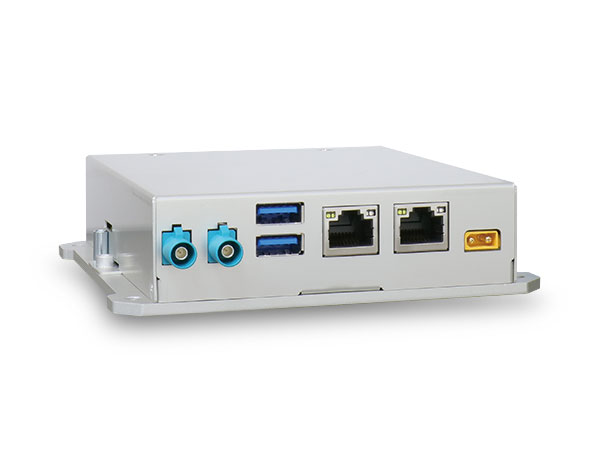
|
NRU-161V-AWPIP66-rated NVIDIA® Jetson Orin™ NX/ Nano Computer with 6x GMSL2, 1x GbE Ports |
NRU-171V-PPCIP66-rated 10.1" NVIDIA® Jetson Orin™ NX/ Nano Panel PC with 6x GMSL2, 1x GbE Ports |
NRU-51V+NVIDIA® Jetson Orin™ NX Edge AI Computer with 4x GMSL2 Ports |
FLYC-300NVIDIA® Jetson Orin™ NX Drone Mission Computer with 2x GbE, 2x USB3, 2x GMSL2 |
In-vehicle IVA & ADAS
Scenario
Intelligent video analytics in vehicles play a crucial role in implementing collision avoidance, recognition, and detection, thereby enhancing in-vehicle ADAS capabilities and overall safety. These applications extend to areas such as off-road vehicle ADAS, teleoperation, and railway intrusion detection.
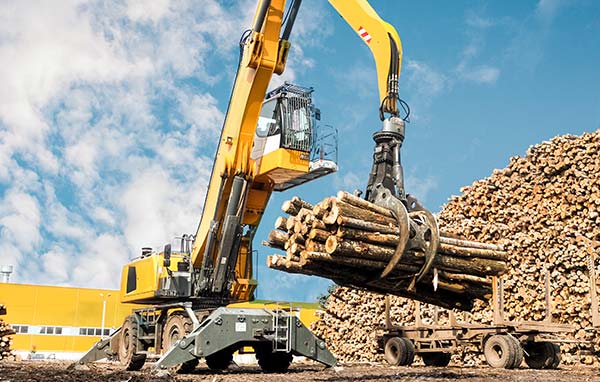
Challenges
To ensure reliable implementation on vehicles, the computing systems need to overcome:
- Multiple camera and sensor connectivities
- Significant AI performance for real-time image processing from multiple cameras
- Limited space for deployment
- Heat dissipation
- Powered by limited battery capacity
- Constant shock and vibration
- Mobile communication capability
- Demanding environments like mining, agriculture, or construction sites
Neousys' Offering
The NRU series features IP66-rated waterproof, rugged designs that simplify in-vehicle deployments, supporting an 8V to 35V DC input, ignition power control, GMSL2, IP cameras, sensors, LiDARs, and more. The NRU-230V-AWP takes it further with an onboard automotive MCU and an independent M12 port for CAN bus and digital output, enabling real-time monitoring and predictive maintenance, reducing downtime and enhancing functional safety for autonomous vehicles.

|

|

|
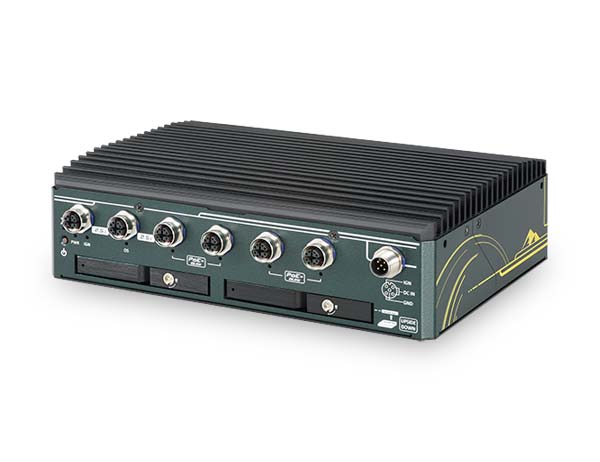
|
NRU-230V-AWPIP66-rated NVIDIA® Jetson AGX Orin™ Computer with 8x GMSL2, 1x 10GbE, 4x PoE+ GbE Ports |
NRU-171V-PPCIP66-rated 10.1" NVIDIA® Jetson Orin™ NX/ Nano Panel PC with 6x GMSL2, 1x GbE Ports |
NRU-162S-AWPIP66-rated NVIDIA® Jetson Orin™ NX/ Nano Computer with 4x PoE+ GbE Ports |
NRU-222SNVIDIA® Jetson AGX Orin™ AI NVR with M12 Connectors |
Resources for download
SWaP-Optimized AI Mission Computer Enabling Unmanned System Applications
Roadside IVA with Rugged NVIDIA Jetson™ Computers
Empowering AMR with Rugged NVIDIA® Jetson™ PCs
Enabling Off-road Vehicles ADAS with NVIDIA® Jetson™ Computers
Neousys Flattop Heatsink Fanless PC for Tough Environments
8-Camera Synchronization and Glass-to-Glass Latency
3-exposure HDR ( >120dB )
| Year | Subject | Download |
| 2022 | Notice of the Annual General Shareholders' Meeting |  |
| 2021 | Notice of the Annual General Shareholders' Meeting |  |
Shareholders Meeting
| Date | Meeting Type | Annual Report | Meeting Notice | Meeting Handbook | Meeting Minutes | Shareholders' Meeting Video |
| 2025/06/24 | AGM | Download | Download | Download | Download | Video Link |
| 2024/06/24 | AGM | Download | Download | Download | Download | Video Link |
| 2023/06/26 | AGM | Download | Download | Download | Download | |
| 2023/02/15 | EGM | Download | Download | Download | ||
| 2022/12/2 | EGM | Download | Download | Download |
The Board of Directors
The company's highest strategy and management body, Neousys Technology's board of directors, in addition to formulating various laws and regulations in accordance with relevant laws and regulations and the powers conferred by the shareholders' meeting, also supervises various implementation results.
Important responsibilities of the board of directors:
- Review the company's business plan
- Review the company's financial reports
- Establish an effective and appropriate internal control system
- Supervise and deal with various risks faced by the company
- Planning and formulating the company's business directions and strategies
- Appointment and dismissal of financial, accounting or internal audit supervisors
Diversity and independence of the Board of Directors:
Our company is committed to strengthening corporate governance and promoting the soundness of the composition and structure of the Board of Directors by respecting and advocating for the goal of board diversity. We hope that our diversity policy will contribute to enhancing the overall operational performance of the company. The selection of our Board members is based solely on merit, with a focus on gender equality and the necessary knowledge, skills, and qualities required for the role.
Currently, our Board of Directors consists of five general directors and four independent directors. The diversity policy and its implementation are as follows:
| Diversified core projects | Basic Components | Capabilities | ||||||||||||||
| Nationalit | Gender | Concurrently serving in the company | Age | Term | Ability to make Operational Judgement | Ability to perform accounting and financial analysis | Ability to conduct management administration | Ability to conduct crisis management | Knowledge of the industry | An international market perspective | Ability to lead | Ability to make policy decisions | ||||
| 40~49 | 50~59 | Over 60 |
Less than 3 year |
|||||||||||||
| Chairman | James Gau | ROC | Male | ✓ | ✓ | ✓ | ✓ | ✓ | ✓ | ✓ | ✓ | ✓ | ||||
| Director | CT Hu | ROC | Male | ✓ | ✓ | ✓ | ✓ | ✓ | ✓ | ✓ | ✓ | |||||
| Director | Chris Ni | ROC | Male | ✓ | ✓ | ✓ | ✓ | ✓ | ✓ | ✓ | ✓ | |||||
| Director | Ahong Chen | ROC | Male | ✓ | ✓ | ✓ | ✓ | ✓ | ✓ | ✓ | ||||||
| Director | Celia Hsu | ROC | Female | ✓ | ✓ | ✓ | ✓ | ✓ | ✓ | ✓ | ||||||
| Independent Director |
Ryan Chen | ROC | Male | ✓ | ✓ | ✓ | ✓ | ✓ | ✓ | ✓ | ✓ | ✓ | ||||
| Independent Director |
Grant Kuo | ROC | Male | ✓ | ✓ | ✓ | ✓ | ✓ | ✓ | ✓ | ✓ | ✓ | ||||
| Independent Director |
Sean Fan | ROC | Male | ✓ | ✓ | ✓ | ✓ | ✓ | ✓ | |||||||
| Independent Director |
Ray Lai | ROC | Male | ✓ | ✓ | ✓ | ✓ | ✓ | ✓ | ✓ | ✓ | |||||
All current directors of our company have experience in the management or operations of various industries. In the future, we will revise our diversity policy as necessary, based on the operation of the Board, business model, and development needs, to ensure that Board members generally possess the knowledge, skills, and qualities required for their duties.
According to the company's articles of association, the Board of Directors consists of 5 to 9 members, including five general directors and four independent directors. Independent directors account for 44.44% of the total board members, and the combined number of independent and external directors exceeds half of the total Board members. Currently, 89% (8 members) of the Board are male, and 11% (1 member) are female. We will strive to increase the number of female directors in the future to achieve the goal of gender equality on the Board.
All independent directors of our company comply with the relevant regulations of the Financial Supervisory Commission's Securities and Futures Bureau, and there are no circumstances among the directors and independent directors that fall under Article 26-3, Paragraphs 3 and 4 of the Securities and Exchange Act.
Board of Directors
| Job Function | Title | Experience and Education | Current Positions Held |
| Chairman | James Gau |
|
|
| Director | CT Hu |
|
|
| Director | Chris Ni |
|
|
| Director | Ahong Chen |
|
|
| Director | Celia Hsu |
|
|
| Independent Director | Ryan Chen |
|
|
| Independent Director | Grant Kuo |
|
|
| Independent Director | Sean Fan |
|
|
| Independent Director | Ray Lai |
|
|
Sustainable Development Policy
Neousys Technology has always upheld a spirit of innovation and continual improvement, dedicating itself to developing rugged edge computing devices that closely align with market demands, which are provided to advanced application integrators worldwide, enabling SMART applications and contributing to the progress of human civilization through technology. As a corporate citizen, Neousys Technology not only focuses on contributing through its professional field but is also committed to leveraging corporate resources to fulfill diverse corporate social responsibilities and collaborate globally to promote sustainable development. To facilitate sustainable development, Neousys-Technology adheres to its established Sustainable Development Best Practice Principles, pledging active development in Environmental Protection (E), Social Responsibility (S), and Corporate Governance (G). Furthermore, to concretely implement corporate sustainable development policies, we have further defined the following four development areas, hoping to fulfill our commitment to sustainable development through these scopes:
Corporate Governance
- Strictly adhering to the Corporate Governance Best Practice Principles
- Strengthening the function of the Board of Directors
- Safeguarding the rights and interests of shareholders and stakeholders
- Enhancing information transparency
- Facilitating ethical corporate management
Business Operation
- Promoting the development of innovation and intelligence
- Enhancing digital capabilities of business operation
- Establishing a corporate risk management policy
- Optimizing the supplier management policy
- Promoting the corporate paperless policy
- Promoting green manufacturing
- Four development areas of Neousys
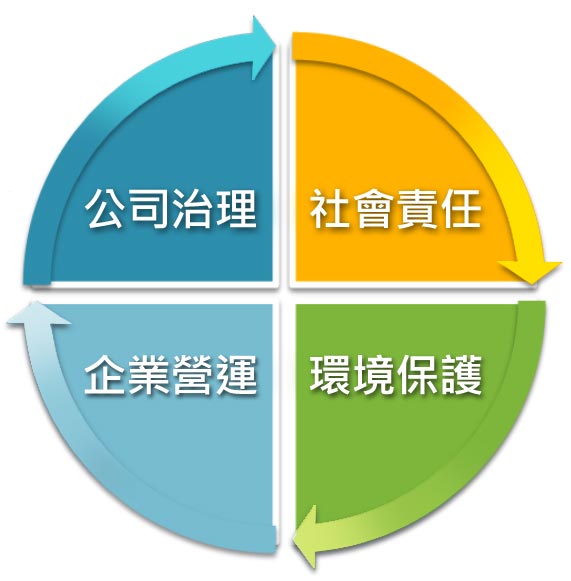
Social Responsibility
- Establishing an explicit human rights policy
- Establishing occupational HSE measurements in compliance with regulations
- Creating a diverse and equal working environment
- Providing comprehensive training courses
- Building up channels for regular employee communications
- Organizing regular charitable activities
Environment Protection
- Establishing an environmental protection policy
- Tracking corporate electricity usage and carbon emissions regularly
- Implementing energy-saving and carbon-reduction measurements
- Organizing environmental protection activities regularly
Sustainable Development Committee
In accordance with the Sustainable Development Best Practice Principles, the Company has established the internal Sustainable Development Committee. The committee is tasked with planning, implementing, and overseeing the Company's sustainable development processes. Comprising five or more members, including senior managers and department heads, the committee is chaired by the President. The detailed responsibilities of the committee are outlined below:
- Stipulating the company's sustainable development direction and goals, devising relevant management policies and specific implementation plans.
- Promoting and materializing initiatives related to the company's sustainable development direction and goals.
- Monitoring, reviewing, and revising the execution and effectiveness of the company's sustainable development.
- Other matters assigned to this committee by the Board of Directors for implementation.
The 2024 Sustainability Committee and Board Meeting Schedule


Stakeholder
Identification:
Neousys Technology defines stakeholders as internal and external groups or individuals that have an impact on or are impacted by the organization's operations. Employees, suppliers, shareholders, and customers are recognized as stakeholders by Neousys Technology.
Neousys Technology collects feedback from these stakeholders through various communication channels, both internal and external. It also considers international trends and standards, customer requirements, and industry practices to identify the issues that are of concern to each stakeholder group. Neousys Technology then formulates response strategies and communication plans for each issue.
Neousys Technology has established various communication and complaint channels for stakeholders to provide feedback and opinions. This is done to understand the stakeholders' reasonable expectations and needs and to provide a response mechanism to address the issues that concern them.
What is edge AI computing to industrial PC?
With data and analytics that originally existed only in traditional data centers or clouds shifting to the edge, it indicates industrial applications are moving from automation to autonomy. But why is it that only a few edge AI platforms are offered by industrial PC manufacturers? Because there are challenges in deploying industrial PCs with AI into the field.
Why integrate AI into industrial PC
Integrating AI into an industrial PC is like creating the learning and reasoning abilities of the human brain but without the effects of bias, fatigue, or emotions. The integration offers intellect that can improve efficiency, accuracy, and productivity.
What are the challenges of integrating AI into industrial PCs?
When you add a GPU card, or a graphics card to the already compact and poorly ventilated embedded enclosure, it disrupts the thermal, power delivery, and installation balance of the system.
Therefore, an industrial PC must be carefully designed so its CPU/ GPU/ component heat dissipation, circuit board layout, bracket mechanisms, interference segregation/ isolation, and enclosure infrastructure can work cohesively and seamlessly to sustain 24/7 optimal system performance in various environmental conditions.
How do we solve the challenges to integrate AI into an industrial PC?
Like the human body, edge computers are subject to environmental factors such as fluctuating/ extreme temperatures, dust, liquid, humidity, salinity, etc. And the power delivery acceptance acts like a food source which is essential to sustain various operations.
Therefore, an industrial PC must be carefully designed so its CPU/ GPU/ component heat dissipation, circuit board layout, bracket mechanisms, interference segregation/ isolation, and enclosure infrastructure can work cohesively and seamlessly to sustain 24/7 optimal system performance in various environmental conditions.
When the human body overheats, the body dissipates the heat to regulate body temperature, and it is no different for industrial PCs. A well-designed and effective heat dissipation for the industrial PC is vital to longevity, stability, and performance. In addition to temperature, other factors like shock/ vibration affect the installation; dust, liquid, and humidity may affect internal components when they seep through.
Having a wide range DC input acceptance is essential to the operation and deployment viability of the system. Accepting wide DC input opens the door to more deployment possibilities as it lowers the voltage specificity to power the system, making it more compatible and flexible in various scenarios.
Which GPU is right for your industrial PC?
By eliminating the effects of environmental factors and power delivery, you can now decide how smart you want your industrial PC to be by installing a GPU card that meets your needs. In terms of AI, the integration of a GPU card enables AI learning and reasoning capabilities, while its TFLOPS (one trillion floating-point operations per second) is an indication of its processing power, it can range from single-digit TFLOPS to several hundred. Remember though, the more the processing power, the more the heat generated. Hence there are various performance grades of GPU cards available, with power consumptions ranging from 30W up to 250W, you can choose to install one, or two, depending on your needs.
Why deploy a Neousys industrial PC as an edge AI platform?
The addition of a GPU card enables the AI capability of an industrial PC, but it complicates the already environment-challenged system in terms of cooling, installation, and power delivery. As one of the pioneers in integrating AI into industrial PCs, Neousys Technology offers a wide range of field-tested industrial PCs with support for entry to advanced GPU cards to meet your deployment and application needs.
Starting from a 4U rackmount system based on a clone IBM PC motherboard for controlling manufacturing process, industrial computer, or IPC, since its debut in 1980s has become smaller and smarter generation after generation over the course to the Era of AIOT and Autonomous Robotics. In addition to factory automation, the application of industrial computers have pervaded across many areas, from intelligent transportation, defense & security, power & energy, medicine, digital signage to utilities operations, environmental monitoring, and many more.
Today, an industrial computer could be embedded in a smart factory machine that produces cutting-edge semiconductor components, or a medical XR apparatus that helps perform brain surgeries, a driverless car that delivers goods to homes, a Kiosk machine that provides self-help services to customers in convenient stores or restaurants, or it could be built in a subway entrance to control the turnstile where you swipe your card to get through.
Industrial computers are not like commercial PCs
They are made to communicate and control
Unlike general purpose computers—such as desktops used at homes or in offices, Industrial computers are special breeds of personal computers (PCs) deployed or embedded in an automatic/autonomous system to provide the niche computing power for collecting and analyzing data and enabling control / monitoring of the system as well as M2M and human-machine communications.
The most advanced such systems, with Machine Learning and Artificial Intelligence (AI) capabilities, command high degree of autonomy and require least human intervention in process. Some people see them as the enabler of The 5th Industrial Revolution which marks the paradigm shift from IoT to AIoT.
Industrial computers are deployed to everywhere of human needs
Their application scenarios
These industrial computers, or IPCs, could be embedded in the wind turbines situated in a desert or a seashore area exposed to enormous day-night temperature difference and other negative environmental factors. Or, they could be embedded in an outdoor system controlling or monitoring energy/power/sewage/transportation facilities and have to withstand harsh and variable weather conditions.
Some of them could be installed in rolling stock or wayside apparatuses susceptible to extreme shocks and vibrations as well as high voltage and electro-magnetic interference. Some of them have AI capabilities and are deployed for driverless vehicles--including autonomous cars and planes--and have to conquer all the extreme situations on the road or in the air.
Some IPCs are embedded in medical apparatuses that must observe the aseptic and hygiene standards for operating rooms. And some could be used in high-end smart factories like semiconductor fabs where clean rooms are 100 times cleaner than a hospital operating room for protecting silicon wafers from ambient contamination.
What make the making of industrial computers so challenging?
The features and benefits of IPC
Therefore, computers made for industrial purposes must fulfill the following features and satisfy the demands of their applications:
- Industrial computers must be made with higher level of rugged designs than normal PCs to provide reliable and stable operations in their application environments that might contain extreme harsh conditions and require 24/7 ceaseless operations. IPCs usually have a wider operating temperature range, higher capabilities in resisting shocks, vibrations, humidity, dust, salt, acid, voltage, electro-magnetic interference, adverse weather, or any other kind of negative environmental factors depending on their application settings and scenarios.
- Industrial computers not only have to maintain compliance with the standards of their domain computers but also often have to observe the industrial standards or regulations in their vertical markets to fulfill application demands and interoperability with other system components.
- For example, computers used for military or defense purposes usually follow the military standards issued by the U.S. Department of Defense (called "MIL-STD" or "MIL-SPEC") in providing interoperability, SWaP (size, weight and power) optimized and rugged platforms ready for quick deployment with off-the-shelf products.
- Industrial computers must have special I/O designs for connecting to different sensors and devices in their purposed application system. Different applications usually have their own I/O emphases. For example, computers used in factory automation usually require serial ports like RS232/422/485 for supporting Modbus/Fieldbus serial communication protocols, or LAN ports for supporting Ethernet, which are rarely seen in commercial computers. Besides, computers used for controlling digital signage would require greater variety in image input/output ports for displaying high quality images, and expansion slots for boosting graphic processing performance. Richer and more versatile I/O designs would usually increase flexibility and expandability for system deployment and deliver greater economic benefits to customers.
How do you choose an industrial computer that best suit your application?
We would like to discuss the prerequisites into two directions, hardware specifications and environmental factors. Let’s start with an industrial computer's specifications.
Hardware Specifications
Check the hardware requirements listed by your software provider for reference.
With modern complex applications, the need for real-time reactions may require artificial intelligence (AI). Applications such as multiple image recognition, or the ability for a machine to sense, reason, act in response to, or adapt according to the application. The complexity of the application will determine the need for an inference accelerator or GPU.
Random Access Memory plays a critical role in deciding computing speed and the overall system performance. ECC (error-correcting code) memory is another type of RAM, which is often chosen for rugged systems or mission-critical applications but typically has a higher price.
For industrial applications, solid state disk (SSD) is more rugged and reliable than the mechanical hard disk drive (HHD), and offers significantly higher throughput, but has a higher price tag per GB of storage. If your system will rely on edge computing rather than uploading most data to the cloud, you will need larger capacity for data storage, HDD will be a more economic choice. Of course, you may like to have both of them and obtain high speed and high capacity at the same time if your budget allows.
Communication is vital in embedded computing and it brings connected systems into a harmonious sync to execute tasks. Therefore, it is important to make a list of all the devices and equipment the industrial computer will need to establish links and identify their I/O type. You don’t want to have a computer deployed to your floor which is not able to fetch data from all of your critical devices and have to install a second computer to compensate.
An embedded computer often has to fit in a space facing restrictions in size, weight and power (SWaP), which sometimes run into contradiction with performance demand. Understand your environmental restrictions and choose a computer with form factors that meet your needs.
Your system is expected to be used for years to generate returns on investment, but technologies are always advancing and your system could be left behind. To protect your investment and maximize economic benefits, choose an industrial computer with future-proofing designs, so you can upgrade your system and add new features without sacrificing your existing system.
Your budget constraint is always your biggest pain point in planning your project and choosing a perfect computer. All your dreams about computing performance and stunning features have to be measured against your budget ceiling.
Environmental Factors
When choosing an industrial computer for your application, the "environmental factors" are of utmost importance, because, if the computer cannot operate in the deployed environment, all other specifications are just irrelevant. So understanding the environment your industrial computer will be operating in 24/7 becomes crucial to a successful deployment.
Heat is the biggest enemy for electronic components in a computer. Without an efficient thermal dissipation design, it can cause a processor to thermal throttle (reduced operating frequency) resulting in performance degradation; and the effects of long term high temperature operation of electronic components may also significantly reduce their lifespan! Many computers are deployed out in the open and perhaps have to boot under minus zero coldness in the morning and operate under blazing sun in up to 50°C air temperature at noon. Computers deployed to manufacturing facilities often have to face constant extreme heat. So identifying the temperature range in your application setting and make sure that your IPC supplier is able to provide "real" wide temperature support to meet your application needs.
Many computers are deployed to a confined space and will need a SWaP optimized design; others could be deployed in vehicles or mobile applications like autonomous mobile robots (AMRs) and will face extreme shocks and vibrations during operation. Find a computer with reinforced capabilities that address the characteristics of your application location.
Many vertical markets have their common environmental concerns that IPC applications have to address, such as shock and vibration, humidity, salinity, temperature, and many more, and certain industries have developed their own standards for electrical or electronic equipment. For example, defense applications often follow MIL-STD for ruggedness compliance; railway applications are often required to address the international standards in anti-electromagnetic interference and anti-shock and vibration capabilities; computers used in medical applications should observe water/dust proofing and aseptic standards. If you don’t have clear ideas about specific environmental requirements of your applications, look into industrial certifications for reference and assurance.
Overview
Supporting up to Intel® Xeon® E and 9th/ 8th-Gen Core™, Neousys edge AI computing solutions offer unparalleled performances with true wide-temperature operation to ensure CPU/ GPU do not thermal-throttle under harsh conditions. With an array of ruggedized embedded GPU solutions that feature NVIDIA® Tesla, Quadro®, Jetson Xavier, RTX 30 series consumer-grade graphics cards and Google TPU, Neousys GPU computing solutions are ideal and can be found in medical imaging, video analysis, deep learning machine vision, autonomous machines and more.

Product Highlights
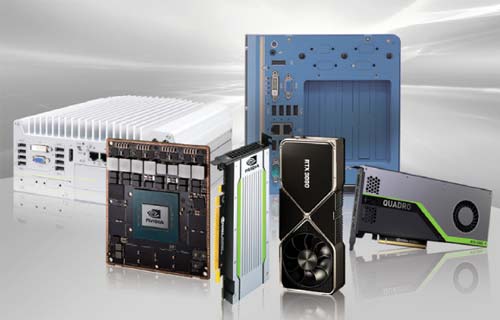
Complete GPU Support
Ranging from RTX 30 series, Tesla, Quadro, Jetson™ Xavier to Google TPU for high-performance or power-efficient applications.
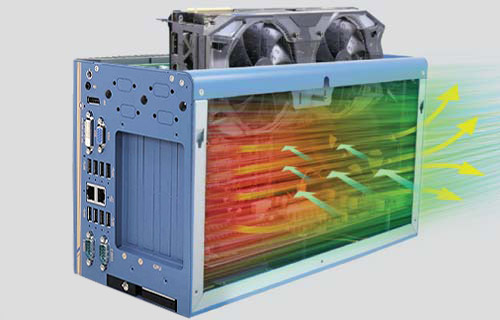
Patented Thermal Design
Offering better heat distribution and dissipation for optimal performance to prevent CPU/ GPU from throttling.
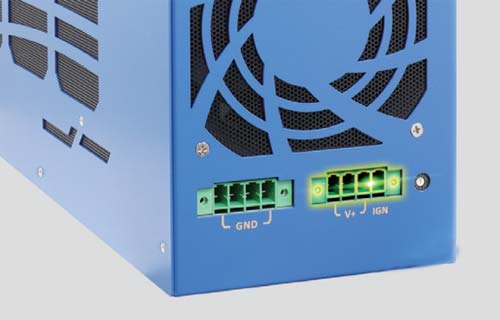
Ignition Power Control
Built-in ignition control to safely shutdown and startup the system.
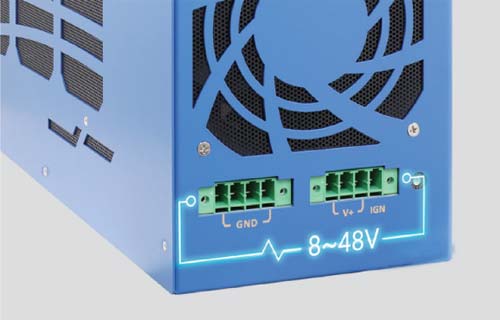
Multi-GPUs via Single Wide-range DC Input
Accepting a wide range DC input from 8 to 48V, and requires only a single source of power input to sustain operation for dual high end RTX 30 series GPU cards.
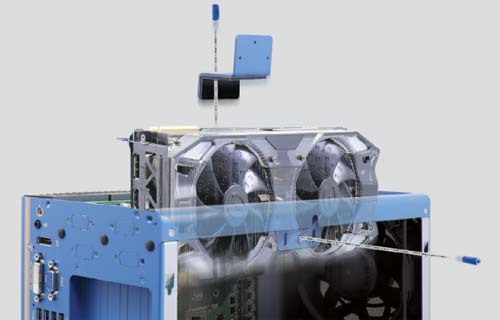
Adaptive GPU Bracket
The patented adaptive GPU bracket ensures installed graphics cards are always secured in position to withstand shock and vibration.
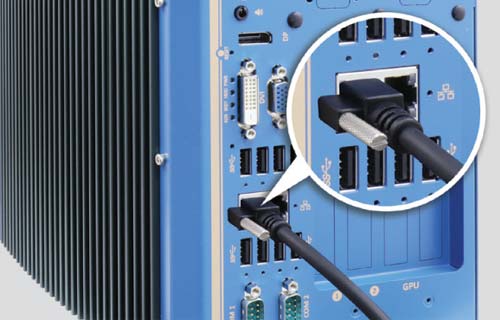
Rich I/Os with Screw-lock Machanism
Available with an abundance of I/Os and screw-lock mechanism for reinforced connections.
Patented Damping Bracket
The patented damping bracket effectively absorbs shock and vibration up to 3Grms for reliable and stable operations.
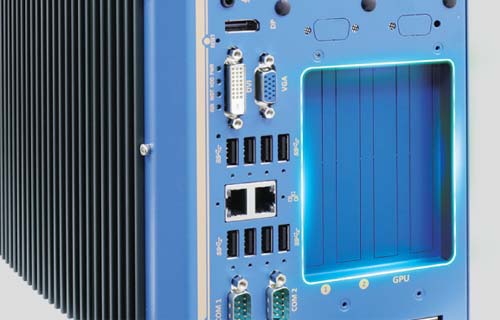
Expansion Capability
PCIe/ PCI add-on slots allow for connectivity or functionality expansion.
NVIDIA® Tesla T4
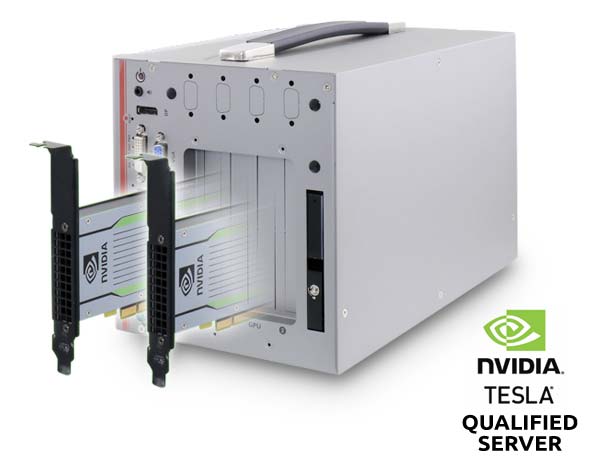 |
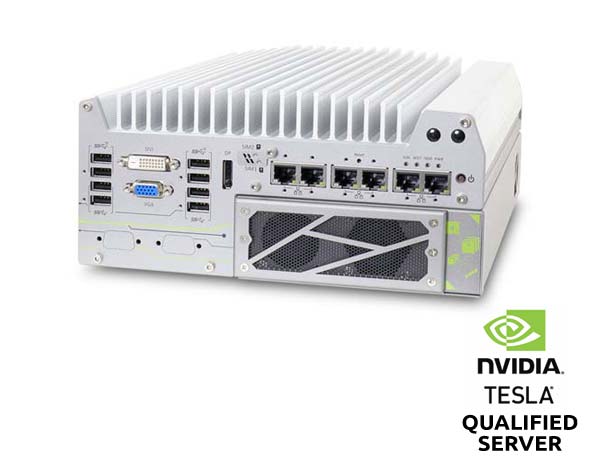 |
 |
 |
|
|
|
|
 |
 |
 |
 |
NVIDIA® Quadro P2200
 |
 |
 |
||||||||||||||||||
|
|
|
||||||||||||||||||
 |
 |
 |
||||||||||||||||||
NVIDIA® Jetson AGX Xavier™
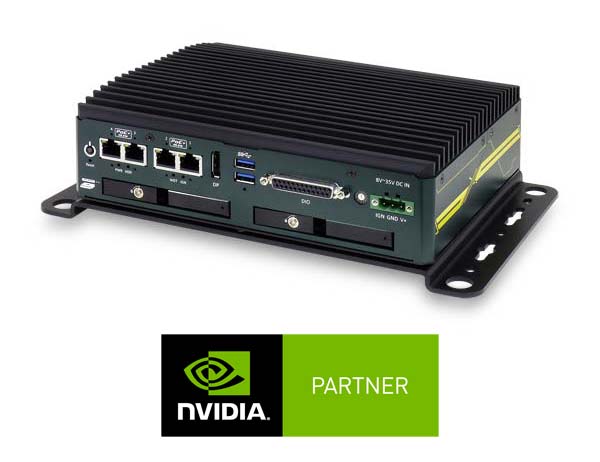 |
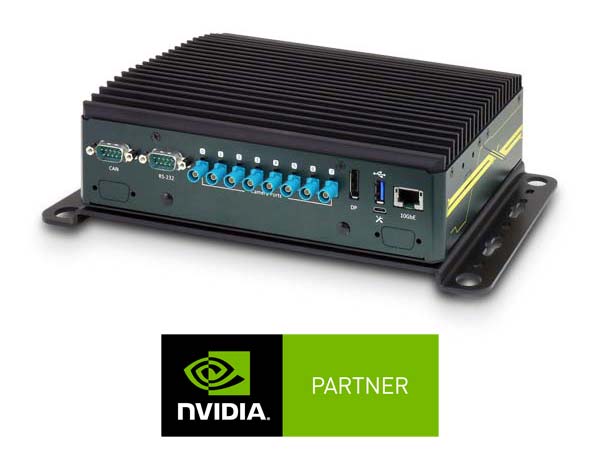 |
||||||||||||
|
|
||||||||||||
 |
 |
||||||||||||
NVIDIA® RTX 30 Series
 |
 |
 |
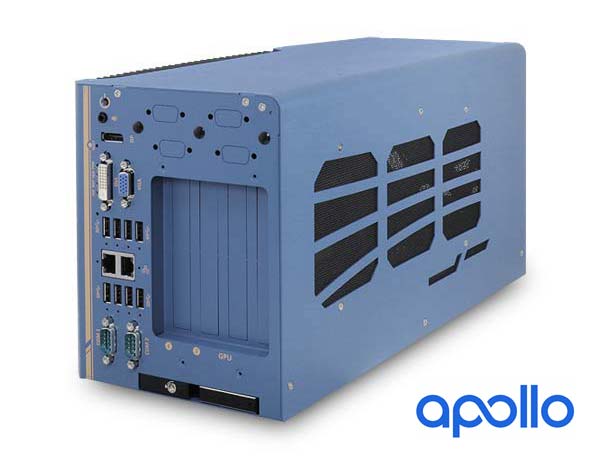 |
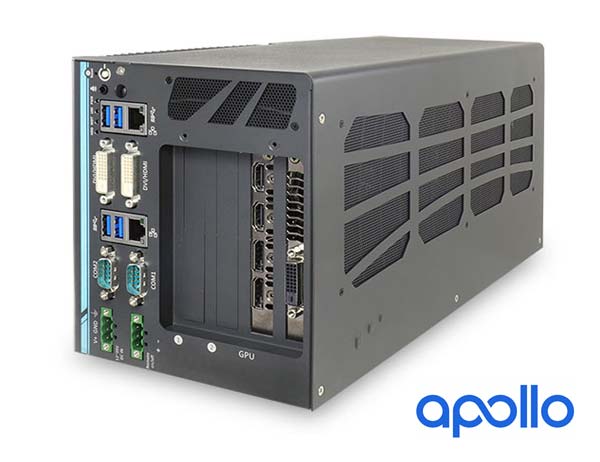 |
||||||||||||||||||||||||||||||
|
|
|
|
|
||||||||||||||||||||||||||||||
 |
 |
 |
 |
 |
||||||||||||||||||||||||||||||
Mainstream and Google TPU
 |
 |
 |
||||||||||||||||||
|
|
|
||||||||||||||||||
 |
 |
 |
||||||||||||||||||
Resources for download
Thriving At The Edge - A New Generation of Industrial Computers
Applications
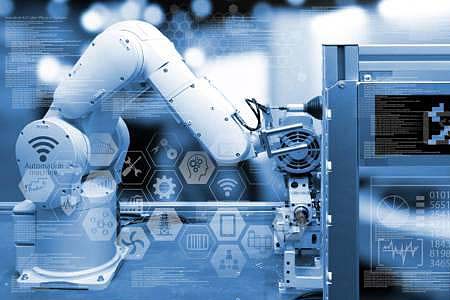
Industrial Automation
Industrial automation plays an important role in today's manufacturing industries. Neousys edge AI GPU computers are designed to thrive in extreme factory environmental conditions to boost the efficiency and efficacy of your manufacturing production line.
Case Study:
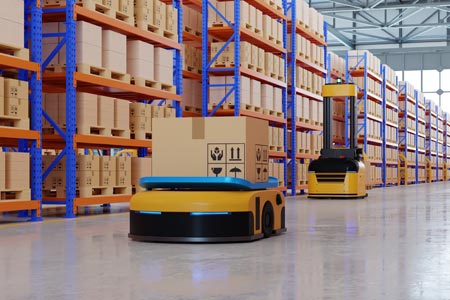
Retail & Logistic
Trying to increasing warehouse productivity can be difficult to achieve with limited workers to ship high volumes of packages. Neousys edge AI GPU computers make logistics intelligent, from middle mile to last mile, improving the efficiency and efficacy of logistics.
Case Study:
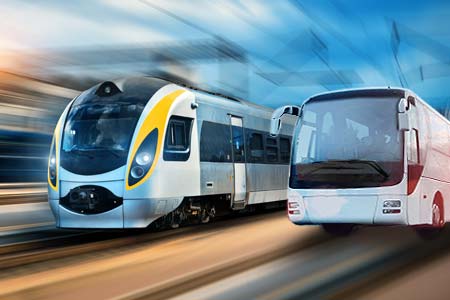
Smart Transport
Neousys has an excellent history of in-vehicle application and transportation industry. With computers ranging from EN50155 certified to renowned open-source autonomous vehicle project, Baidu Apollo, the applications aim to bring safer than safe technologies to the industry.
Case Study:
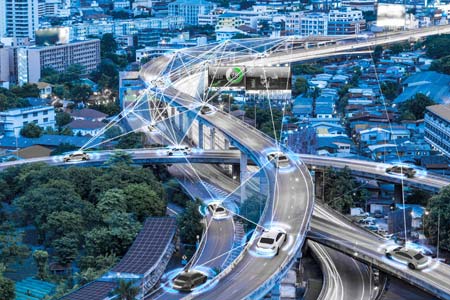
Smart City
Utilizing IoT, smart cities collect, analyze mass data for insights to improve the city on all fronts. Neousys edge AI computers with optimized CPU/ GPU performance offer video analytics capability, stability and reliability for smart city deployments.
Case Study:
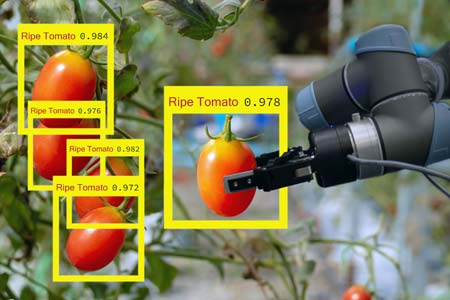
Agriculture
With need for farmers and increase in productivity, digitizing to precision agriculture and farming equipment allow farming crews to work on a greater piece of land and produce better yields. Neousys edge GPU computers can assist farmers in various ways.
Case Study:
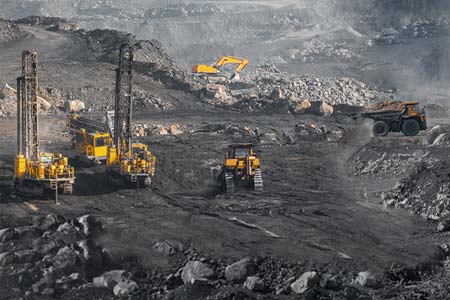
Mining
Chemical emissions and extreme conditions make mining industry one of the most hazardous for workers and equipment. Neousys edge AI GPU computers are designed to endure such conditions and enable autonomy on mining vehicles.
Case Study:

Maritime
Climatic corrosion is the most devastating corrosion type. Seeping through the smallest of openings in the chassis, it erodes circuits and solder points on the PCBA causing major failures. Neousys offers a unique airtight chassis design while providing unparallel performances.
Case Study:
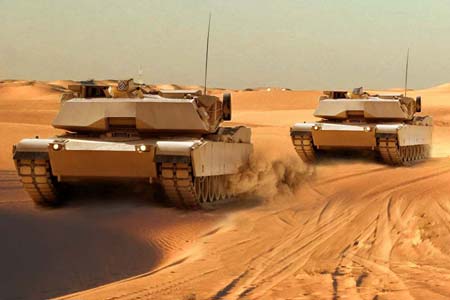
Military Defense
Defense system integrators face an ever-increasing need for greater computing and bandwidth while struggling with integration difficulties. With Neousys, the patented technologically advanced solutions offer high-performance mission-critical COTS computers.
Case Study:
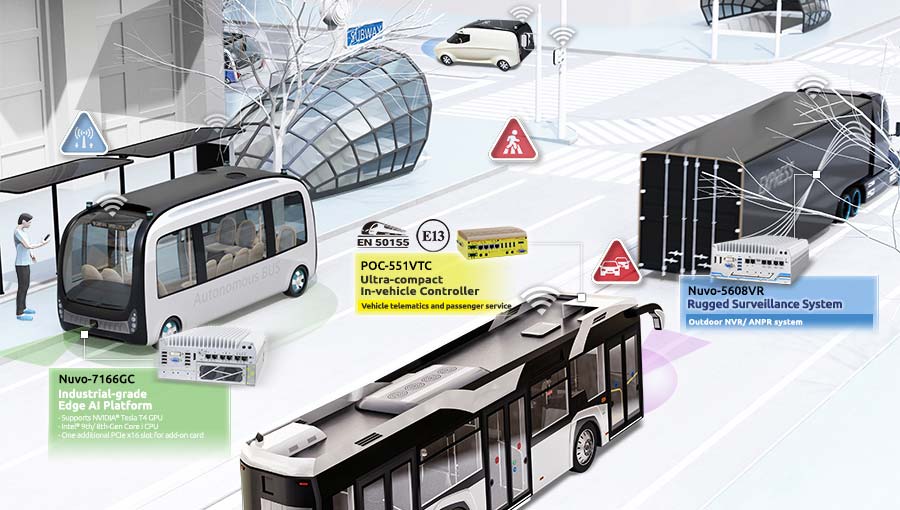
Surveillance Then and Now
Back in the days, surveillance cameras were only placed and found at need-to-be places such as financial institutes, public mass gathering spaces like train stations or any other place that needed stringent security measures. The need for safety and security served as the two main key factors for cameras recording 24/7 that brought people, peace of mind. The idea of surveillance recording is that once something has happened, we can review the videos and find the perpetrator. That is still somewhat the case today but as technologies evolve, the surveillance technologies have also leapfrogged.
Gone are traditional analog videotape recordings with sub-par image resolution. The storage tapes are problematic as they are prone to wear; and are troublesome when searching for video segments. While traditional field site cameras were simply just cameras recording onsite images and offer no other functions. But make no mistake, those were the pinnacles of video surveillance technology at the time.
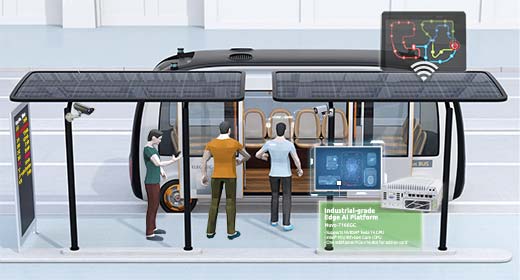 Today, video surveillance can be found almost around every corner. At home, people set up their security IP cameras with motion detection warning so they can monitor with their handheld devices; in industrial factories, cameras monitor the safety of workers on the floor that automatically warns people in the control room in case there is a need to shut down machines to prevent disasters from happening; on trains, buses and at stations, cameras and mobile surveillance systems may be linked to law enforcement systems that can collect and analyze data to reduce/ prevent accidents; or they may have onsite video analytic applications such as facial recognition, for immediate countermeasures.
Today, video surveillance can be found almost around every corner. At home, people set up their security IP cameras with motion detection warning so they can monitor with their handheld devices; in industrial factories, cameras monitor the safety of workers on the floor that automatically warns people in the control room in case there is a need to shut down machines to prevent disasters from happening; on trains, buses and at stations, cameras and mobile surveillance systems may be linked to law enforcement systems that can collect and analyze data to reduce/ prevent accidents; or they may have onsite video analytic applications such as facial recognition, for immediate countermeasures.
Mobile Surveillance Technology Expands the Comfort Zone
Though the two main key factors, safety and security remained the same, technologies today have enhanced how we define surveillance camera systems. The inclusion of shock and vibration proof, wide temperature platforms have also facilitated the possibilities of mobile surveillance. The PoE technology makes cameras installations easy to set up while industrial-grade power backup module ensures data integrity in the field. No longer are cameras just for local imagery or video recording, the application of edge AI/ inference and facial recognition technologies have made the cameras in a way, our first line of defense.
Neousys Technology offers a wide variety of edge AI and inference capable rugged embedded computers that support graphics card processing power or NVIDIA T4 for deep learning, Neousys systems are ideal platforms for modern mobile surveillance systems.
IP67 Waterproof Extreme Rugged Embedded Computer and GPU Computer
CPU + GPU

IP67 Waterproof
Fanless Wide-temp
CPU + UPS

Products Highlights
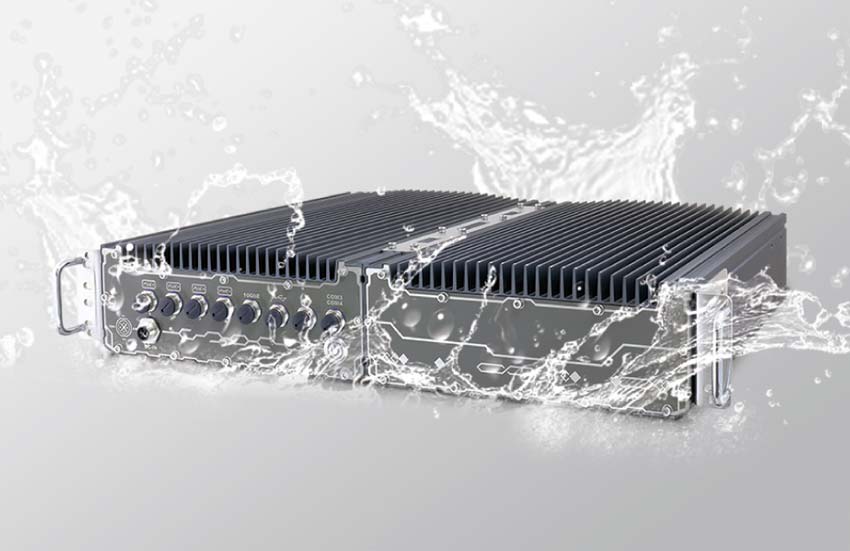
IP67 Rating
IP67 waterproof capability is achieved via specialized molded o-rings and enclosed in stainless steel and aluminum chassis for corrosion resistance
M12 Connectivity
The M12 connectivity features COTS availability and is a cost-effective solution while maintaining robustness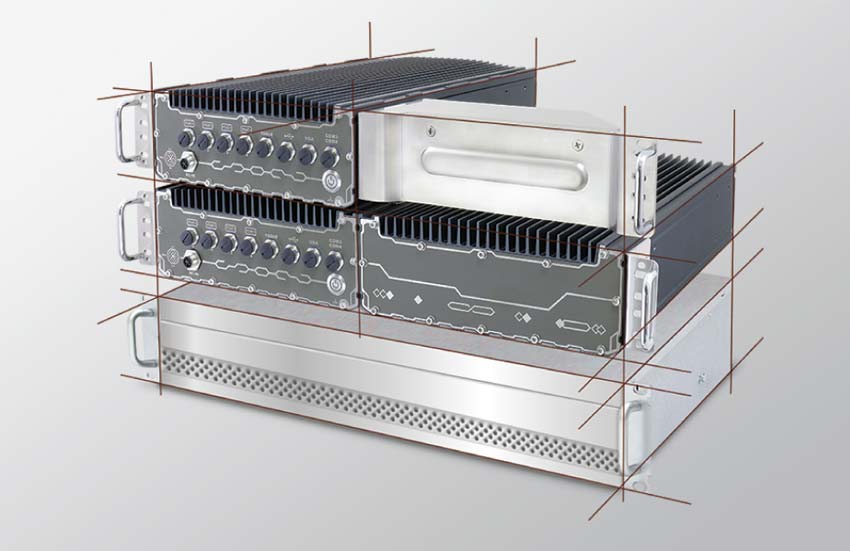
2U Half-rack/ 19" Rackmount
Available in standard form factors with unique brackets for flexible rack or wall-mount deployment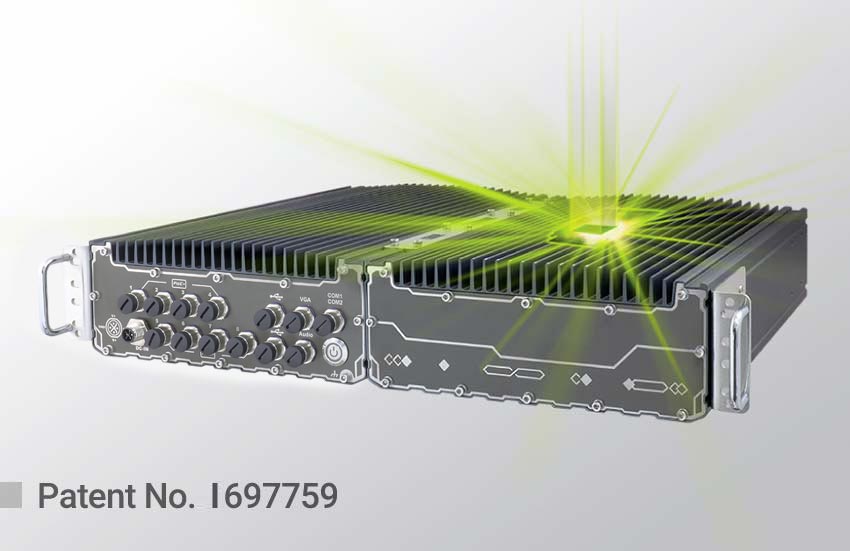
True Wide-temp Fanless with GPU
NVIDIA® RTX A2000/ Tesla T4/ Quadro P2200 can operate up to 62°C ambient without GPU throttling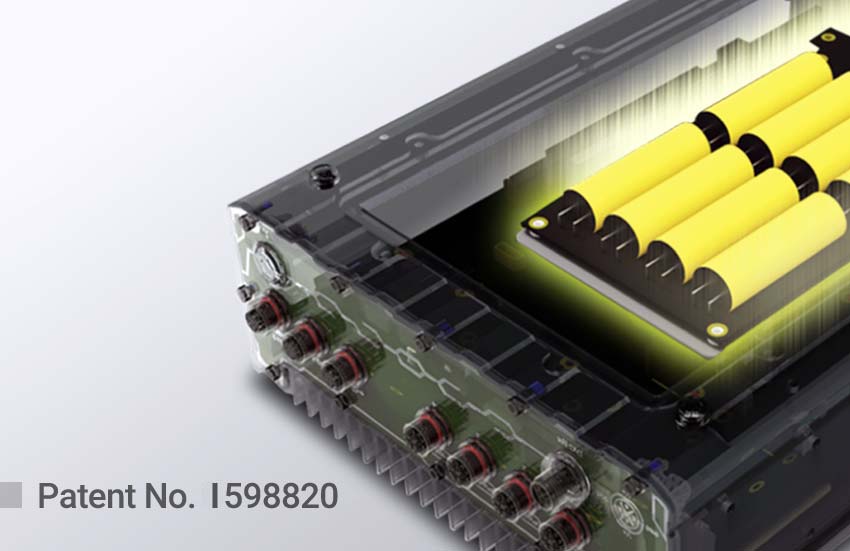
Built-in SuperCAP UPS
Patented SuperCAP UPS effectively prevents data loss while featuring greater reliability and longevity over traditional battery UPSResources for download
Neousys SEMIL IP67 Fanless GPU computer
Applications
Mining
Equipped with multiple mPCIe slots, M.2 B/E key, 5G/4G ready, wide-range 8-48V DC input with ignition control, patented thermal design to guarantee -25°C to 70°C fanless operations in a rack-mountable or wall-mountable 2U 19" enclosure, SEMIL computers thrive in autonomous or teleoperated mining equipment such as trucks, shovels, dozers, drillers, loaders, etc.
(Download Application)

Agriculture
SEMIL extreme rugged computers are ideal for autonomous agriculture tractors due to their true fanless, dust and IP67 waterproof design that can operate 24/7 in rain or shine. Guided by GPS or drone for consistent and adequate crop spacing, farmers can manage multiple tractors simultaneously to plant more crops in less time for better yield.
(Download Application)
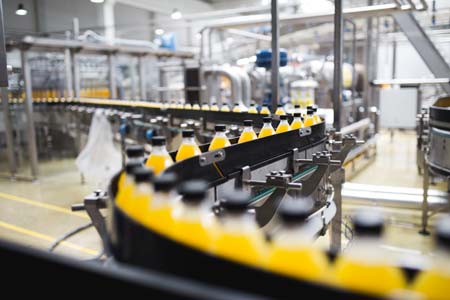
Factory Automation
Supporting an NVIDIA Tesla T4 or Quadro P2200 inference accelerator, the IP67 waterproofed SEMIL extreme rugged computer can perform video analytics, compute complex algorithms and neural network models in the field for real-time video analytics in hazardous environments such as chemical, metal processing, food & beverage industries

Maritime
Enclosed in a monoblock stainless steel chassis and sealed by specialized molded O-rings make SEMIL one of the rare few waterproofed extreme rugged GPU computers with NVIDIA Tesla T4 or Quadro RTX. They are ideal for seaport automation, container inspection, auto straddle carrier, security inspection, and more.

Railway
Available in 2U 19" or half-rack dimensions for ease of deployment, commercial off-the-shelf M12 connectors that can withstand tug and pull, EN50155 certified, coupled with a true fanless design incorporating an NVIDIA Tesla T4 or Quadro RTX, SEMIL can make use of deep learning and neural network for railway inspection, monitoring and security systems.
